
Think Again: Are Education Programs for High Achievers Inherently Inequitable?
This brief challenges the notion that marginalized students of high ability are harmed by advanced education, with implications for better screening measures and expansion of programs.
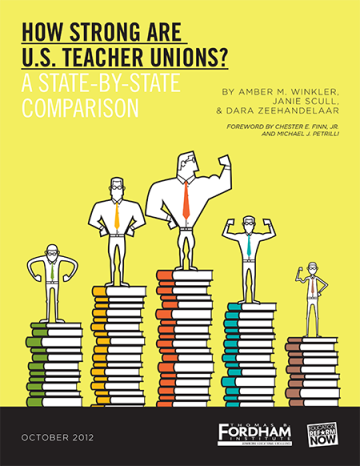
How Strong Are U.S. Teacher Unions? A State-By-State Comparison
This timely study represents the most comprehensive analysis of American teacher unions’ strength ever conducted, ranking all fifty states and the District of Columbia according to the power and influence of their state-level unions.

The Diverse Schools Dilemma
Lots of parents favor sending their sons and daughters to diverse schools with children from a variety of racial and socioeconomic backgrounds. But can such schools successfully meet the educational needs of all those different kids? How do middle class children fare in these environments? Is there enough challenge and stimulation in schools that also struggle to help poor and immigrant children reach basic standards? Is there too much focus on test scores? And why is it so hard to find diverse public schools with a progressive, child-centered approach to education? These quandaries and more are addressed in this groundbreaking book by Michael J. Petrilli.
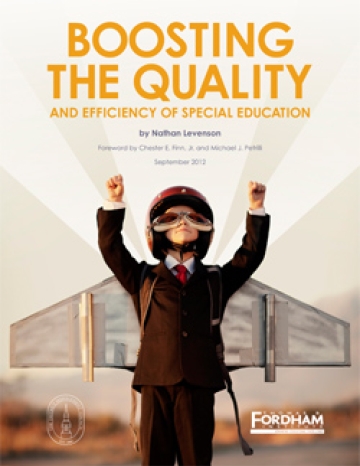
Boosting the Quality and Efficiency of Special Education
This groundbreaking study uses the largest database of information on special education spending and staffing ever assembled to uncover significant variance in how districts staff for special education. The report concludes that if the high-spending districts studied reduce their staffing in this area to the national median the public could save $10 billion and offers clear recommendations for improving special-education quality and efficiency.
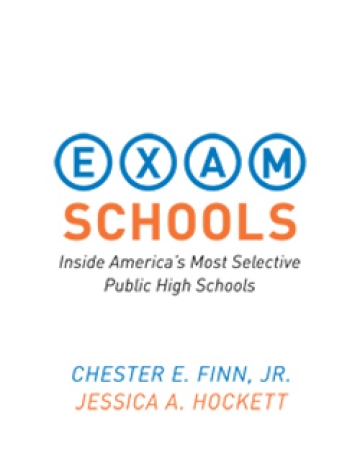
Exam Schools: Inside America's Most Selective Public High Schools
What is the best education for exceptionally able and high-achieving youngsters? There are no easy answers but, as Chester Finn and Jessica Hockett show, for more than 100,000 students each year, the solution is to enroll in an academically selective public high school. Exam Schools is the first-ever close-up look at this small, sometimes controversial, yet crucial segment of American public education.
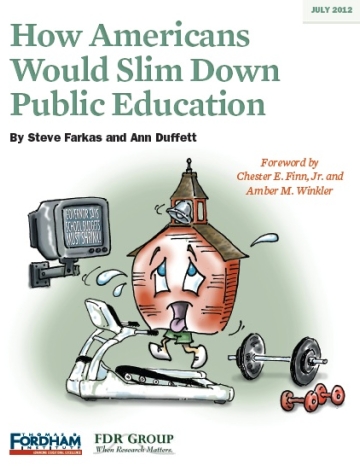
How Americans Would Slim Down Public Education
Education budgets are tight and state and district leaders must make tough decisions about where to save. But is the public willing to accept cuts? If so, where? According to the results of this new survey, many Americans are open—selectively open—to dramatic changes in how school districts do business.
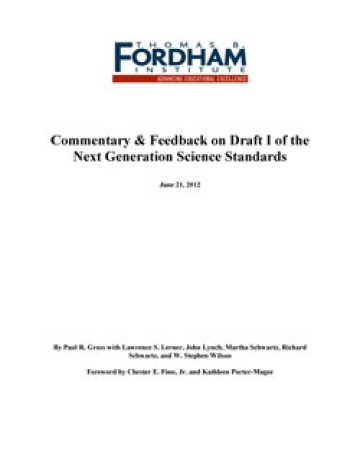
Commentary & Feedback on Draft I of the Next Generation Science Standards
In May, Achieve unveiled and solicited comments on the first draft of the Next Generation Science Standards, the product of months of work by a team of writers from twenty-six states. This document provides commentary, feedback, and constructive advice that Fordham hopes the NGSS authors will consider as they revise the standards before the release of a second draft later this year.
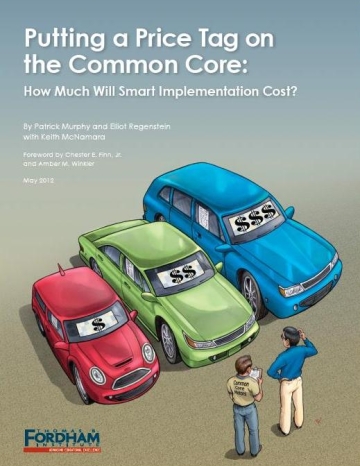
Putting a Price Tag on the Common Core: How Much Will Smart Implementation Cost?
The Common Core State Standards (CCSS) for English language arts and mathematics represent a sea change in standards-based reform and their implementation is the movement’s next—and greatest—challenge. Yet, while most states have now set forth implementation plans, these tomes seldom address the crucial matter of cost. This report estimates the implementation cost for each of the forty-five states (and the District of Columbia) that have adopted the Common Core State Standards and shows that costs naturally depend on how states approach implementation.
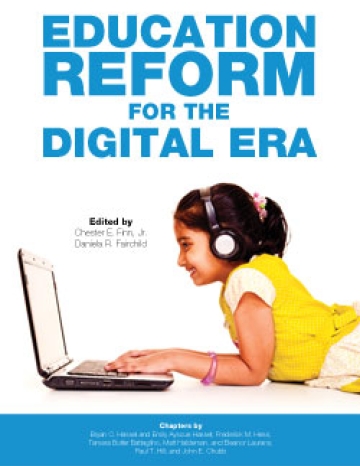
Education Reform for the Digital Era
Can we be smarter about taking high-quality online and blended schools to scale—and to educational success? Yes, says this volume, as it addresses such thorny policy issues as quality control, staffing, funding, and governance for the digital sector. Read on to learn more.
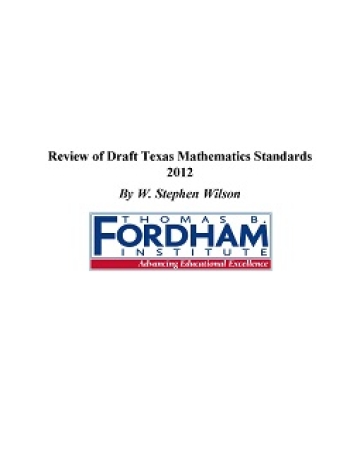
Review of Draft Texas Mathematics Standards 2012
In April 2012, Texas adopted new math standards. Fordham reviewed the draft standards and found them to be a modest improvement. But not by much, and they remain inferior to the Common Core math standards. Download the review to learn more.
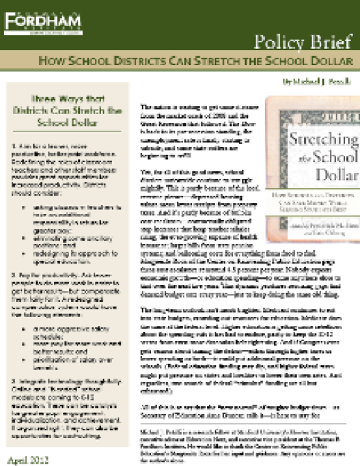
How School Districts Can Stretch the School Dollar
The "new normal" of tougher budget times is here to stay for American K-12 education. So how can local officials cope? This policy brief, by Mike Petrilli, provides a useful tool for navigating the financial challenges of the current school-funding climate, complete with clear dos and don'ts for anyone involved in or concerned with local education budgets.
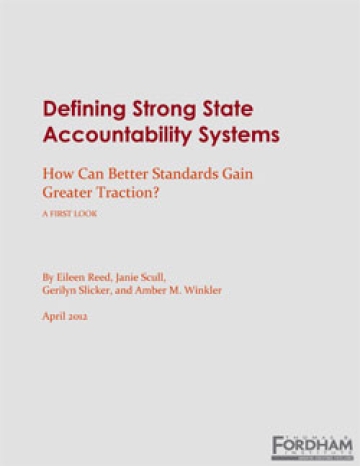
Defining Strong State Accountability Systems: How Can Better Standards Gain Greater Traction?
Rigorous standards and aligned assessments are vital tools for boosting education outcomes but they have little traction without strong accountability systems that attach consequences to performance. This pilot study lays out the essential features of such accountability systems, intended to add oomph to new common standards and aligned assessments.
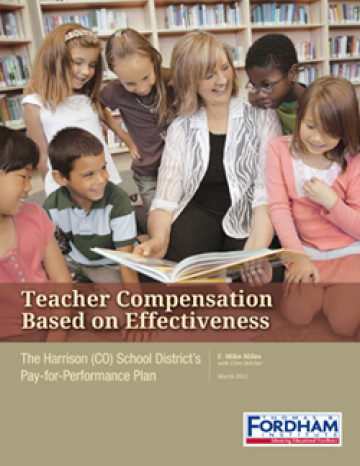
Teacher Compensation Based on Effectiveness: The Harrison (CO) School District's Pay-for-Performance Plan
This report, authored by Superintendent Mike Miles, takes a detailed look at the Harrison (CO) School District 2's Pay-for-Performance Plan. The Harrison Plan confronted the dual challenges of defining an effective teacher and identifying all the things that demonstrate her effectiveness. This how-to guide is meant to serve as a tool and model for Ohio’s school districts.